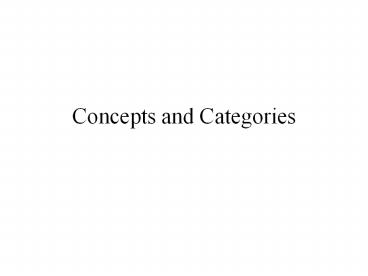Concepts and Categories - PowerPoint PPT Presentation
Title:
Concepts and Categories
Description:
Concepts and Categories Concepts and Categories Concept a mental representation Category the set of things picked out by the concept Why do we need them? – PowerPoint PPT presentation
Number of Views:76
Avg rating:3.0/5.0
Title: Concepts and Categories
1
Concepts and Categories
2
Concepts and Categories
- Concept a mental representation
- Category the set of things picked out by the
concept - Why do we need them?
- To make predictions
- To prevent information overload
3
Effects of Categorization
- 1. categorical perception
- categorical perception perceiving things in
discrete categories rather than as points on a
continuum. - Characteristics
- sharp change in probability of category labeling
at the category boundary - greater between-category than within-category
discriminability - 2. category labels' effect on perception (Tajfel
Wilkes, 1963) - 3. implications stereotypes
4
What is Categorization Based on?
- Similarity?
- Similarity as shared features
- But which features?
5
Semantic Feature Models of Concepts
- The classical view defining features
- The probabilistic view
- prototypes (Rosch, 1977) Coglab demo next
slide - exemplars (Medin Schaffer, 1978 Hintzman,
1986) - Whats the difference? Internal structure
- Hybrid models defining characteristic features
6
Prototypes Coglab Results
- Pattern type Reaction time (ms)
- Prototypes 718.68335
- Variants 752.62085
- SOURCE grand mean
- A N MEAN SD SE
- 50 752.0379 228.3917 32.2995
- SOURCE A
- A N MEAN SD SE
- Variant 25 778.1483 246.9372 49.3874
- Prototy 25 725.9275 210.0015 42.0003
- FACTOR RANDOM A DATA
- LEVELS 25 2 50
- TYPE RANDOM WITHIN DATA
- SOURCE SS df MS
F p
7
Different kinds of concepts?
- dog, tree, diamond (natural kind objects, basic
level) - Collie, oak, industrial diamond (natural kinds,
subordinate level) - animal, plant, geographical feature (natural
kinds, super-ordinate level) - hammer, chair, cup (artifact objects)
- felony, majority, contract (abstract,
conventionally defined) - candy cigarette, dog bed, phone book (non-novel
noun-noun combinations) - apple chair, carpet light, ear filter (novel noun
combinations) - Brazil, Richard Nixon, Jupiter (names)
- wife, senator, friend (social roles)
- justice, peace, existence (abstract nouns)
- bake, eat, explode (verbs)
- red, hot, large (perceptual adjectives)
- entropy, genus, photosynthesis (technical terms)
8
Types of Concepts
- Natural kind concepts
- Artifacts
- Conventionally defined
- Other types?
9
Similarity Re-examined
- non-reflexivity of similarity
- non-transitivity of similarity
- context-dependence of similarity (Tversky, 1977)
- similarity can not simply equal the number of
shared features - similarity does not always predict categorization
- Psychological Essentialism (for natural kinds)
- Ad-hoc categories not defined by similarity
10
Theory Theories of Concepts
- Organization of concepts is knowledge-based
rather than similarity-based (Keil, 1986, 1987
Murphy Medin, 1985). - People's intuitive theories are the basis for
categorization of natural kind objects. This has
particularly been argued for biological kinds.
11
Conceptual Combination
- Modification? (brown apple)
- Separate Prototypes? (big wooden spoon)
- But sometimes the combination has a prototypical
feature that is not typical of either noun
individually (pet birds live in cages, but
neither pets nor birds do) - Extending salient characteristics?
- When nouns are alignable (zebra horse)
- But non-alignable nouns are combined using a
different mechanism (zebra house)
12
Context-Dependence of Conceptual Combination
- Sit in the apple-sauce chair.
- Is conceptual combination really about the
structure of concepts, or is it about the
pragmatics of language use?































